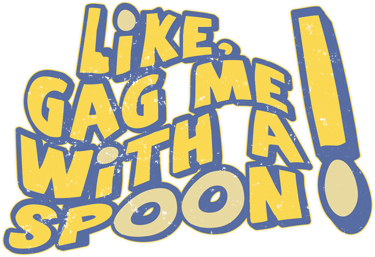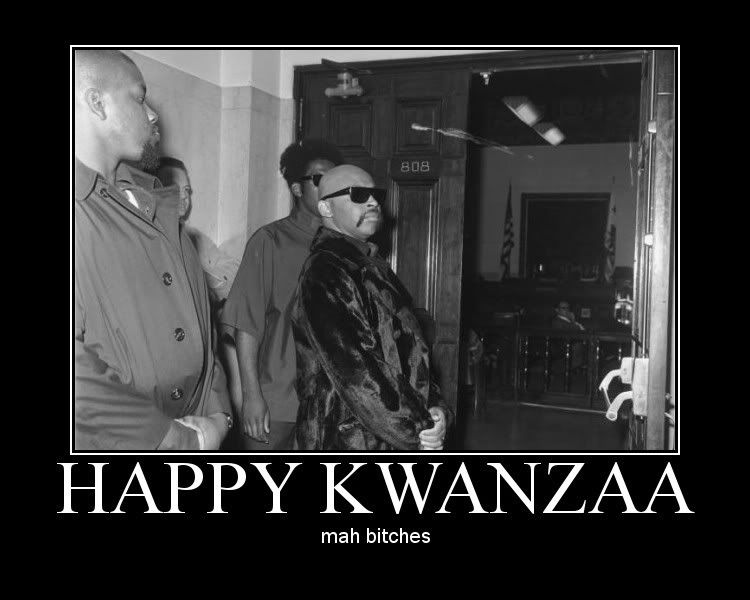
Posted on 12/11/2010 2:52:43 PM PST by Dallas59
Felicia Green showed up with the heath care equivalent of a grocery list.
"Had my flu shot. Got tested for HIV. Now I'm going to check out some of those clinic resources," the 25-year-old from Dallas said Saturday.
Green hadn't stepped into a hospital, although a warehouse full of health care services awaited her. She'd come for KwanzaaFest, an annual event that celebrates black culture and community.
Two decades after Dallas hosted one of the country's first Kwanzaa celebrations, the small-scale activity has ballooned into a boisterous two-day festival dominated largely by the social services it provides. Officials expect more than 50,000 people at Fair Park this weekend to honor black heritage and health.
(Excerpt) Read more at dallasnews.com ...
I love celebrating fake holidays made up by convicted felons.
I especially love those vice grips and electrical cords wrapped around my privates!
All kinds of free services being featured at an ethnic festival? Usually I see these kinds of events as a day to see the culture, food and music of the group being celebrated.
I’d be a bit put back if a Slovak festival featured such a menu of freebies, I don’t know what the feeling of African Americans are about this?
The festival organizers are basically saying that seeking free medical care and screening is a very important part of black culture.
In the end...life imitates stereo type....celebrate kwanza by sucking the teet of Govt....Ironic...


F Kwaanza
Worse than Festivus.
On December 26, 1966 Ron Karenga and his family and friends lit the Unity candle, the Umoja candle, and commenced the first Kwanzaa.
Kwanzaa has only gained popularity since. On December 24, 1971 the New York Times ran their first article covering the festival, and recently the Postal Service released a Kwanzaa stamp. Hallmark, too, has begun to market the holiday.
Seven principles--one for each day of the feast--guide the celebration: Umoja, Kujichagulia, Ujima, Ujamaa, Nia, Kuumba, and Imani. In English, the principles are unity, self-determination, collective work and responsibility, cooperative economics, purpose, creativity, and faith. Today, the holiday does not serve as a replacement for religious holidays, although it may, but rather is a secular event aimed at encouraging American blacks to remember their African roots.
The founder of Kwanzaa, Ron Everett, a.k.a. Maulana Ron Karenga, stood at the forefront of the black power movement in the 1960s. Karenga distinguished himself as a "cultural nationalist" as opposed to a traditional Marxist. In 1965 Karenga founded the United Slaves Organization (US), a group that would rival the Black Panthers on the UCLA campus. The US was more radical than the Panthers, setting off quarrels between the two.
The biggest dispute between the US and the Panthers centered around the leadership of the new Afro-American Studies department at UCLA; both groups backed a different candidate. On January 17, 1969, 150 students gathered to discuss the situation. Panthers John Jerome Huggins and Alprentice Carter used the meeting to verbally attack Karenga, much to the dismay of his followers. Two US members, George and Larry Stiner, confronted Huggins and Carter in a hallway after the meeting and shot and killed them.
A May 11, 1969 letter in The Black Panther officially denounced Karenga. Wilbur Grattan, the Minister of State and Foreign Affairs of the "Republic of New Africa," wrote to Bobby Seale: "Speaking in the position of Minister of State and Foreign Affairs for RNA, I have always felt that Ron Karenga represented a great deal less than the best interests of the Black Liberation struggle against domestic colonialism, white racism, and world-wide imperialism."
This, however, did not faze Karenga, who continued to build and strengthen the US. Members of the US followed the "Path of Blackness" detailed in The Quotable Karenga, authored by Karenga himself. "The sevenfold path of blackness is think black, talk black, act black, create black, buy black, vote black, and live black," the book states.
The US would not last too much longer. On September 17, 1971, Karenga was sentenced to one to ten years in prison on counts of felonious assault and false imprisonment. The charges stemmed from a May 9, 1970 incident in which Karenga and two others tortured two women who Karenga believed had tried to kill him by placing "crystals" in his food and water.
A year later the Los Angeles Times described the events: "Deborah Jones, who once was given the title of an African queen, said she and Gail Davis were whipped with an electrical cord and beaten with a karate baton after being ordered to remove their clothes. She testified that a hot soldering iron was placed in Miss Davis' mouth and placed against Miss Davis' face and that one of her own big toes was tightened in a vice. Karenga, head of US, also put detergent and running hoses in their mouths, she said."
The shooting at UCLA caused Karenga to become deeply paranoid and spurred his bizarre behavior. At his trial, the question of Karenga's sanity arose. The psychiatrist's report stated, "This man now represents a picture which can be considered both paranoid and schizophrenic with hallucinations and elusions, inappropriate affect, disorganization, and impaired contact with the environment." The psychiatrist observed that Karenga talked to his blanket and imaginary persons and believed that he had been attacked by dive-bombers.
Eight years later California State University at Long Beach made Karenga the head of its Black Studies Department. Karenga had toned down his rhetoric and abandoned his cultural nationalism for straightforward Marxism. As an academic Karenga has authored various books on such topics as Egyptian art and has guest lectured at Stanford.
Initially, Kwanzaa proceeded from Karenga's hostility toward Western religion, which, he wrote in his 1980 book, Kawaida Theory, "denies and diminishes human worth, capacity, potential and achievement. In Christian and Jewish mythology, humans are born in sin, cursed with mythical ancestors who've sinned and brought the wrath of an angry God on every generation's head." He similarly opposed belief in God and other "spooks who threaten us if we don't worship them and demand we turn over our destiny and daily lives."
Thus, Karenga explained in his 1977 Kwanzaa: Origin, Concepts, Practice, "Kwanzaa is not an imitation, but an alternative, in fact, an oppositional alternative to the spookism, mysticism and non-earth based practices which plague us as a people and encourage our withdrawal from social life rather than our bold confrontation with it." The holiday "was chosen to give a Black alternative to the existing holiday and give Blacks an opportunity to celebrate themselves and history rather than simply imitate the practice of the dominant society."
Since then, the holiday has gained mainstream adherents, and Karenga has altered its justification so as not to alienate practicing Christians: "Kwanzaa was not created to give people an alternative to their own religion or religious holiday," he writes in Kwanzaa: A Celebration of Family, Community, and Culture, published in 1997.
Still, some charge that the holiday and its official black, green, and red flag promotes racial separatism and violence. Says the official Kwanzaa Information Center: "red, or the blood, stands as the top of all things. We lost our land through blood; and we cannot gain it except through blood. We must redeem our lives through the blood. Without the shedding of blood there can be no redemption of this race." The Kwanzaa Information Center also notes that the flag "has become the symbol of devotion for African people in America to establish an independent African nation on the North American Continent."
James Coleman, a former Black Panther, argues, "By only stressing the unity of black people, Kwanzaa separates black people from the rest of Americans. Americans must unify on whatever principles ensure we live in a safe, prosperous, God-loving country, with the race and ethnicity of any American seeking to abide by those principles being of no consequence."
—J. Lawrence Scholer and the Editors
.
Know it all to well and the KaKa-Wants-Zat’s Commie Background.
yah...talk about yanking aside the Irony Curtain...
If you’d posted this earlier, we could have had a FR meetup down there. And if we’d taken full wallets, we could have ‘given back’ to the community by walking from the rail station.
What a surprise.
Time for the feats of laziness........
Free my butt!
Anybody know who pays for this? I read the article but it's not clear.
Never mind. Apparently it is sponsored by companies who get "free advertising" in return. See here.
Great place for Kwanzaa shopping. Stock up on the bootleg videos and computer games.
As long as they insist on separate holidays celebrating themselves collectively and presenting themselves as collective victims and refusing to believe in the power of the individual, they will remain at the bottom of the social heap. After a while, the most tolerant people start to lose patience and will view them collectively as they wish.
Kwanzaa's Airing of the Grievances from January 1 to December 31 of each calendar year makes it more attractive to some people.
Mr. Niteowl77
Disclaimer: Opinions posted on Free Republic are those of the individual posters and do not necessarily represent the opinion of Free Republic or its management. All materials posted herein are protected by copyright law and the exemption for fair use of copyrighted works.